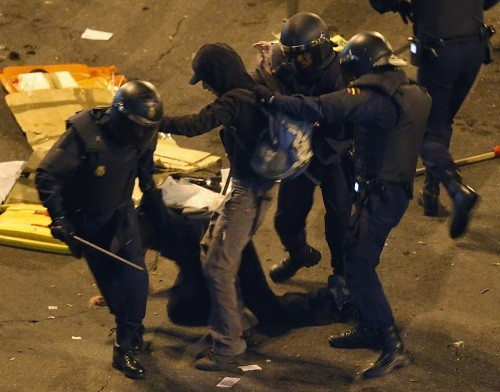Unmasking the Indignados: Why Spain's Youth Took on the Government [BLOG]

As the dust settles on the protests in Madrid in September, Inmaculada Reinoso Conesa speaks to some of those angered by the government and explores the reasons behind the discontent which has swept through her country.
Madrid, 29 September 2012. Thousands of exasperated people are concentrating in the vicinity of the Spanish parliament building after the presentation of the 2013 national budget. A throng of indignados, coordinated through social networks, protest against government policies.
It is not the first demonstration they are taking part in and it almost certainly won't be the last. It´s just one of many gatherings reflecting the overall feeling of discontent among the Spanish people in relation to the strategies carried out by the politicians who purport to represent them.
Most indignados feel that their views have simply been ignored by the governments of both José Luis Rodríguez Zapatero and his successor, Mariano Rajoy. By organising a demonstration on this scale, they are fighting for the recovery of "citizen power" - the very nucleus of democracy. This movement is much more than a simple demonstration - it is the biggest social mobilisation that Spain has experienced in years.
The protestsstarted in May 2011. Since then, there have been dozens of demonstrations in every one of Spain's cities. The indignados are not only displeased about the government policies; they are also fighting for collective rights such as housing, education or health. They think that the 2013 budget recently unveiled by the goverment has been drawn up with no consideration for the opinions of the populace. And they claim that the government's national plan does not dedicate enough money to basic social needs.
In addition to these basic grievances, the indignados also fight for the right to a more "dignified" work culture, particularly among young people. Finding a job in Spain seems to have turned into an impossible issue - a situation which is even more scandalous when one considers the number of people who hold a university degree. Many of those educated to tertiary level, even those who have a PhD, are being forced to emigrate from Spain in search of better employment possibilities due to a chronic lack of investment in research and development in our country.
Most students find that the labour market is simply not attuned to their professional expectations. They face poor pay and conditions related to temporary contracts, jobs without prospects and constant insecurity. Consequently, they leave their homes in search of a place where their knowledge, acquired during many years of hard work, will be more valued. As a result, Spain is suffering the biggest emigration movement among young people in decades - possibly of all time.
'Our system values ignorance'
Salvador Aznar, 29, is among those who have supported the numerous demonstrations that have taken place in Madrid. He has a degree in biology and is finishing his PhD in biotechnology and biomedicine. Despite his high qualifications, he is unemployed. Salvador has his own opinion about the high unemployment rate among young Spanish people and the difficulties they face in order to carve out a future for themselves. He thinks that this situation is mostly due to "dreadful" labour planning carried out by the Spanish government in recent years.
In Salvador´s opinion, the present government has completely failed in its duty to integrate young graduates, the lifeblood of a young, dynamic economy, into the labour market. The biologist considers that it is "shameful" that qualified students have to leave their own country in order to find a job in a different place after the state has invested so much public money in their education.
He adds: "In Spain, public positions which are supposed to be occupied by highly qualified people are filled by people chosen through string-pulling. We have many examples of Spanish prime ministers that, for example, are not capable of speaking a word in English. I think that we belong to a corrupt system that values ignorance".

'We are not criminals'
Nuria Urzaiz, 24, is a drama student with a degree in English philology. Like Salvador, she believes people's studies are simply not appreciated in Spain, especially where university degrees are concerned. She cannot understand why highly skilled people are forced to leave their own country. Otherwise, they must either take jobs that have nothing to do with their preparation or ones in which they feel exploited.
"I was raised in a culture of perseverance, one which valued effort and rewarded for hard work and study. For that reason, I have always been extremely involved in my studies, even when I achieved very good grades. All that effort was for nothing, because the society that we live in simply does not appreciate it", states Nuria.
For this and many other reasons, many people in Spain think that the government is solely culpable for the current economic situation. Salvador, like most Spanish people, attends as many demonstrations as he can. He considers that this kind of mobilisation is a vital release for the popular sense of discontent: "It is important that people can manage their protests as part of their freedom of speech. Luckily, people are starting to wake up from a lethargy caused by some mass media that frequently manipulates and offers biased information", says the biologist.
Nuria has also supported most demonstrations in Madrid during the past year. She thinks it is necessary that people take to the streets to make themselves heard. However, she is terrified of the violence used by the police during the protests. "We are not criminals, although we have been treated like so," she says.
She considers that the government acts purely in its own interests, and she also thinks that politicians don't have enough courage to defend the country.
"Everything is a deception in Spain. What we need to do is to attack the root causes of the problem. We must develop quickly, raise social awareness and educate ourselves in order to be more supportive of each other," she says.
Another issue of great importance at this point is the debate about the Spanish property system. Spanish people are convinced that politicians should reduce their income drastically. "We cannot allow millionaire wages for [political] positions held in short periods of time when we are experiencing serious problems related to recession", explains Salvador.
Nuria thinks that going into politics should be purely vocational. "Although there are many cases of politicians devoted to their profession, most of them are corrupt", she claims.
There are still some people who can dredge positives from the situation. One is Ana Maside, 26, who studied law and journalism and has managed to secure a job in France - making her one of the lucky ones. She believes that, in Spain, dire necessity is proving the mother of invention - as demonstrated by the growing number of people thinking about setting up their own business: "Some of these projects are very original and powerful, and spread the message that one should not give up hope".
Unlike many of her fellow manifestantes, Ana considers that the situation is not the government's fault in the sense that the global economic crisis began before its term of office. Nevertheless, she believes that the executive power will be responsible for the consequences of the budget cuts as regards basic public services.
As these testimonies demonstrate in glaring clarity, the situation for everyday people in Spain is extremely serious. Forget the ideologies or political parties; we are fighting for a proper public health system, decent housing, free education and decent employment possibilities for everybody. We must struggle hard to get on in life together. At the moment, our only recourse is to protest against the wrong-headed decisions of those who represent us. We hope it is just a matter of time before our voice is heard.
Inmaculada Reinoso Conesa is a journalist and blogger who has worked for publications in Spain and the United States. She regularly writes about Spain's political and economic situation, and has attended several demonstrations to report on the protest movements against the government.
© Copyright IBTimes 2025. All rights reserved.





















